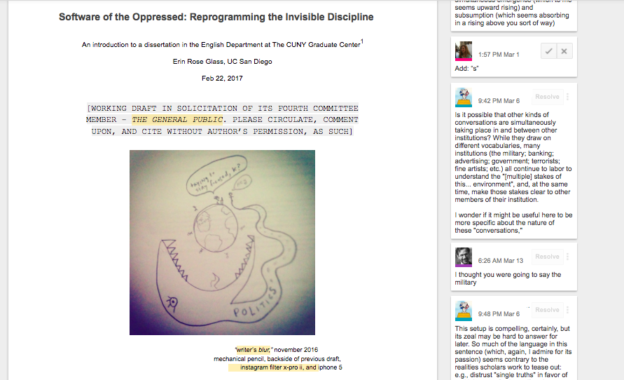To what extent can the general public participate in and benefit from the production of a dissertation? How might the private and anxiety-ridden processes of education be transformed into a public good and social joy? Are the imperfect artifacts of learning to be hidden and disposed of as shameful waste, or might they provide fertile soil for the cultivation of a global learning community? Could the form of the dissertation itself blossom into something more vibrant and responsive to today’s world in the process?
In the search of an evermore cooperative, influential, and self-directed student public, I am launching #SocialDiss, a project in which I will post each chapter of my dissertation draft to a different commenting platform in solicitation of public peer review.
This social academic experiment, inspired by the participatory values of the HASTAC network and proud heir of the minor tradition of experimental humanities dissertations, is an extension of my work in student-directed writing technology. It is also tightly-linked to the the topic of the dissertation itself. “Software of the Oppressed: Reprogramming the Invisible Discipline” explores the historical development of the university’s reproductive role in our everyday software environment, as seen from the unlikely site of the humanities. Here I attempt to draw connections between academic ideology, especially as it relates to writing, and the dire political situation of digital technology today. The objective of the dissertation is not merely to critique, but to point to the university’s promising role in digital emancipation, and enact a humble step in that direction.
I am kickstarting #SocialDiss today by posting a link to its first installment, my introduction “The Cyborg University as Reproductive Organ of the Cyborg World,” which I’ve posted on Google Docs. This introduction sketches out the idea of cyborg oppression, or the mass suppression of collective user freedom to critically understand and transform the digital technology of everyday life, and makes suggestions for how the university might reconfigure its relationship to technology as a means of carrying out an inclusive cyborg liberation.
By far and away, the most valuable part of this introduction is the more than 90 comments it has already received since its quiet launch in February, which have dramatically expanded my thinking on the dissertation’s topic. I’ve been both delighted and humbled by the unexpected knowledge produced in the interactions between commenters whose specialities range from computer science to the history of medieval universities. While I am already overwhelmed by the generosity and intelligence shown in these comments, I invite new and interested readers to continue the dialogue, either here in the margins, or in our collective effort of reprogramming knowledge production and its tools for a more just, intellectual, and cooperative public.
Read the introduction and comment here: tiny.cc/cyborgUniversity
Follow updates on the project here: tiny.cc/socialDiss
